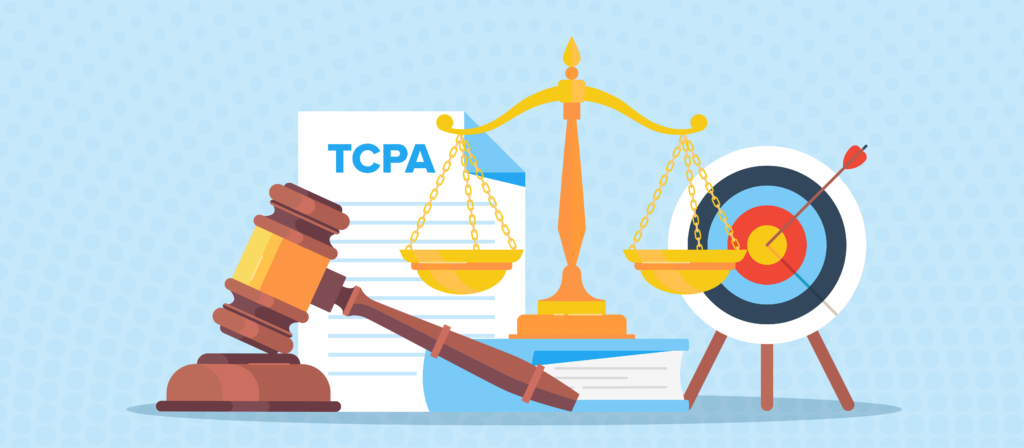TCPA rules: What is changing and how to adapt to the new regulations

The TCPA (Telephone Consumer Protection Act) regulations are constantly evolving to keep up with the ever-changing paradigms of online marketing and online consumer habits. As a marketer, it’s important for you to stay up-to-date and alert because you need to know how these changes are going to impact your business, for better or for worse.
We’ve had the pleasure of attending conference presentations with Eric J. Troutman from the Troutman Amin Firm and TCPAWorld.com, one of the best-known lawyers in the U.S. telecom legal space, and in this article, we will go over the new TCPA rules and regulations to see what’s changing and how to be prepared for it.
TCPA rules: A general overview
If you’re not familiar with the TCPA, here is a high-level definition to help you understand what it is. In Eric Troutman’s own words: “The TCPA is part of the federal response to the robocall epidemic. It’s the statute that prevents the use of certain regulated technology to make calls to cell phones and landlines without certain levels of consent – that are use-case specific – and prevents unsolicited marketing calls to phone numbers that are residential lines on the national DNC (Do Not Call) list.”
Violating the TCPA can result in a penalty ranging from $500 to $1,500 per violation. The TCPA includes a four-year statute of limitations, meaning that every call that is made by a company can be used to initiate legal proceedings up to four years after it was made. Also, class actions are enabled, which means that one call could result in a class action involving millions of different consumers who received similar calls. And millions of consumers involved equal millions of dollars in fines.
To learn more about the TCPA and why it’s so important to comply with it (for everyone, but especially for lead vendors) to comply with it, read this article: Why obtaining TrustedForm certificates is vital to keep your lead-selling business running smoothly.
New TCPA rules in 2025
The FCC’s 2025 updates to the TCPA put the spotlight squarely on how businesses handle revocation of consent. While the anticipated 1:1 consent rule was officially scrapped, the new revocation rules are far from a soft landing; they bring real, enforceable change that businesses can’t afford to ignore.
What’s changed in 2025
1. Opt-outs can come from anywhere
As of April 11, 2025, consumers can revoke consent to be contacted (via phone/text) by any reasonable means. That doesn’t just mean replying “STOP.” It potentially includes revocation by:
- Text messages
- Emails
- Phone calls and voicemails
- Saying “don’t contact me” in conversation
- Even informal messages via social media
If the message is clear, it counts. The burden is now on you to prove otherwise.
2. You’ve got 10 business days to comply
The old 30-day buffer is gone. You now have 10 business days to remove a consumer from your contact list (phone, text) after they revoke consent. Any delay risks being labeled non-compliant and may trigger a DNC complaint or legal inquiry.
3. Confirmation messages are allowed—With limits
You’re permitted to send one confirmation message after a text message opt-out request. But it must:
- Be sent within five minutes
- Contains no marketing content
- Be purely informational (e.g., “You’ve been unsubscribed”)
- Scope clarification is allowed. A business may use this one-time message to clarify the scope of the opt-out request. For example, if a consumer had previously consented to receive both marketing and informational messages from a business, the confirmation message could ask if they wish to opt out of just the marketing messages or all communications.
However if the consumer doesn’t respond, the business must assume that the opt-out revocation request applies to all future texts and calls.
4. Broader opt-out scope is likely coming next
A key provision was delayed until April 11, 2026 related to application of universal revocation opt-out could be applied across channels for different types of messages. In this a consumer’s revocation of consent to receive one type of message or call could be applied to all future calls and texts from that sender, regardless of the subject matter or specific business unit.
For example, if a consumer receives a marketing text from a bank’s promotions department and replies “STOP,” this universal opt-out could require the bank to cease all other automated communications to that phone number, including things like:
- Fraud alerts
- Account balance notifications
- Appointment reminders
Take this time to prepare because if implemented, the new rule will raise the stakes for sloppy list hygiene practices for messages classified as informational/transactional or sales/marketing / promotional.
These changes underscore the importance of a consumer-centric approach in telemarketing and SMS outreach, with robust systems to manage consent efficiently.
Best practices for 2026
As we approach 2026, significant TCPA rule changes can never be expected to slow down for the lead generation industry. The new rules place a heavier emphasis on consent management and revocation practices.
To stay compliant and maintain consumer trust, businesses need to align their strategies with these new regulations. Here are some best practices that companies can implement to prepare effectively for these updates.
1. Create flexible opt-out systems
As of April 11, 2025, consumers can revoke their consent in any reasonable manner, not just by texting standard keywords like “STOP.” This means businesses will need to be agile and responsive in recognizing and processing various opt-out messages, whether through text, email, or even social media. Key preparations include:
- Diversify opt-out channels: Enable consumers to opt out through multiple methods, including SMS, email, or chat, and ensure that staff is trained to recognize these requests.
- Automate non-standard responses: Implement AI-driven customer service tools that can detect different expressions of consent revocation (e.g., “I don’t want to receive messages” or “please stop contacting me”) and automatically process them as valid opt-out requests.
- Test and refine opt-out processes: Regularly audit and test opt-out mechanisms to confirm they are functioning across all platforms and message types.
2. Adopt a 10-day compliance window for opt-outs and Do-Not-Call requests
The FCC requires businesses to honor DNC and opt-out requests as soon as possible, but within 10 business days, significantly speeding up the time allowed for compliance. Failing to meet this window could result in regulatory penalties, so establishing a prompt and reliable process is essential:
- Automate list management: Use software that automatically updates contact lists to exclude numbers as soon as an opt-out or DNC request is received.
- Set alerts and reminders: For manually handled requests, be sure to provide teams have reminders and alerts to remove numbers from contact lists within the 10-day window.
- Maintain a centralized DNC database: Keep all DNC requests in a centralized, secure system to prevent any oversights and streamline audits.
3. Utilize one-time opt-out confirmations effectively
The TCPA rule changes permit businesses to send a one-time confirmation SMS to acknowledge an opt-out request. This message must be sent within five minutes of the opt-out and must contain no promotional material. Done right, this confirmation can reassure customers that their preferences have been respected:
- Standardize confirmation messages: Pre-write compliant, non-promotional templates for opt-out confirmation messages, ensuring they are concise and purely informational.
- Automate timing controls: Maintain that confirmation messages are sent within the five-minute window through automation software, avoiding delays that could lead to non-compliance.
- Educate staff on limitations: Train employees handling these messages to avoid any additional content beyond the basic confirmation, thus reducing the risk of accidental non-compliance.
By proactively adopting these best practices, businesses can not only remain compliant but also build stronger consumer relationships through transparent communication, timely opt-out processing, and respect for consumer preferences. Preparing ahead of these deadlines will ensure a smoother transition and set a high standard for consumer experience in 2026 and beyond.
TCPA rule changes: What changes in the regulations
Considering his great knowledge of the matter and hands-on experience, we asked Eric J. Troutman to share with us insights regarding the TCPA rule changes and regulations.
Understand limitations for non-marketing calls to landlines
There is a limitation with regard to non-marketing pre-recorded calls made to a landline.
Prior to December 2020, these calls were all categorically exempt from the TCPA, while following December 2020, the FCC issued a ruling that only three such calls can be made per month without consent, and this rule became effective July 20, 2023.
Under this TCPA rule, in order to be exempt from the TCPA’s consent requirements, callers would be limited to three prerecorded non-commercial, non-telemarketing, or non-profit calls per 30 days, or three calls per week (one per day) for healthcare-related calls, and would need to include an opportunity to opt out of prerecorded calls as part of the message.
The definition of ATDS is narrowing down
Following the 2021 Facebook v. Duguid ruling, the FCC is ruling that avatar technology constitutes a pre-recorded call, thus narrowing down the definition of Automatic Telephone Dialing System (ATDS).
As reported by Eric J. Troutman, the TCPA defines an ATDS as a system that uses a random or sequential number generator (ROSNG) to either store or produce telephone numbers to dial. This includes randomly dialing, dialing from a list of numbers that are being selected using a randomizer, and dialing from a list of numbers where the sequence is being determined by a randomizer.
However, despite this new paradigm, courts continue to struggle with the definition of ATDS. Currently, there is a split of authority between:
- The prevailing majority view, according to which you have to be randomly creating phone numbers to consider your system an ATDS;
- And the minority view, where even systems that have the capacity to dial automatically from a list using a randomizer can still be considered an ATDS.
It is important to make sure you get qualified legal review and opinion if your dialing software or hardware uses a random or sequential number generator (ROSNG).
TCPA state rules are proliferating
Every state in the U.S. already has some form of anti-telemarketing rules in place. However, most were watered down and ignored.
Following the Facebook ruling, things started to change. Florida was the first state to amend its current telemarketing statute, making it a very powerful one (referred to as the “Mini-TCPA”), which prevents calls using an autodialer, to both cellphones and landlines. The definition of “autodialer” in Florida, however, is extremely broad, covering any system that either randomly dials or selects a number to be dialed, which basically could include any workflow tool, making Florida a very tricky state to make telemarketing calls in.
Here are a few examples to show how some states are individually approaching TCPA rules and regulations:
- Oklahoma adopted the Florida Telephone Solicitation Act (FTSA) and made its own Telephone Solicitation Act (OTSA).
- The state of New York adopted a different set of statutes that look at the content of a call and require marketers to provide consumers an opt-out opportunity within three seconds from the beginning of the call, regardless of whether or not they have consent.
- Michigan has a bill that’s being considered (but hasn’t passed yet) that is a completely different paradigm of protection. The proposed bill – in addition to similar limitations on outbound calls and the creation of its own DNC list – provides limitations to calls made to the elderly and vulnerable communities.
- In Washington and California, additional restrictions prevent marketers from sending unsolicited text messages, regardless of the technology used to send the messages.
- Maryland just proposed a new bill that would adopt a Florida-style prohibition on autodialer usage.
- Virginia has an enhanced DNC provision.
- Texas has amended its mini TCPA.
The above shows you a glimpse of how much is going on at the state level, where every state has its own set of “TCPA” rules that are becoming more and more restrictive and likely to be enforced in lawsuits.
Now, let’s deep dive into the TCPA rules that are in place for each marketing medium
TCPA rules for pre-recorded calls
Pre-recorded calls or artificial voice calls or robocalls are the most highly regulated by the TCPA. At the federal level, marketers cannot make a pre-recorded call or send an artificial voice message to any cell phone without express written consent for marketing purposes, and regular express consent for informational purposes.
Moreover, they cannot make pre-recorded calls or send artificial voice messages to landlines for marketing purposes without express written consent, but they can make unlimited pre-recorded calls for informational purposes with regular express consent. Or, as we’ve explained before, they can make up to three non-telemarketing calls via pre-recorded voice calls to a landline per month. After that, they need to have express written consent.
But what is the difference between express written consent and regular express consent? Also, what is the difference between a telemarketing and an informational call? Let’s deep dive into that.
Express written consent vs. regular express consent
As explained by Eric J. Troutman, express written consent is defined by the FCC and needs to comply with nine requirements in the disclosure. It’s a written agreement between the caller and the receiver of the call that clearly authorizes the caller to deliver “advertisements or telemarketing messages using an automatic telephone dialing system (ATDS) or an artificial pre-recorded voice.”
This type of consent must be conspicuously disclosed and separately signed. Here is an example of how express written consent should look.
Source: TCPA World
On the other hand, regular express consent is not as specifically regulated or defined, and it usually consists of fine print inside the terms of conditions. Regular express consent can also be presumed.
For example, if you give your phone number to your bank, your bank has presumed express consent that it can contact you for informational purposes consistent with the reason you provided the number. For instance, they’re allowed to send you automated text messages about your bank account if you provide your phone number.
Telemarketing vs informational calls
The definition of telemarketing or telephone solicitation is “introducing a good or a service to the consumer for sale or for rent.” So, technically, everything else may be considered an informational call.
However, there are many instances where the dividing line between the two is not so clear. The classic example of a mortgage company calling to communicate that rates have dropped. On a surface level, it sounds informational, but the core purpose of the call is to get the consumer to call back to schedule a refinancing. So, is it really informational?
What appears to be informational calls can be considered telemarketing calls, depending on the intent with which they are made.
TCPA autodialer and manual calls rules
If you are dialing using an ATDS, then you have to have express written consent for telemarketing calls, and regular express consent for informational calls.
If you are calling without an ATDS, at the federal level, you do not need any type of consent for informational calls that are made manually, but you still need to have express written consent for a manual marketing call to a number on the national DNC list.
Again, It is important to make sure you get qualified legal review and opinion if your dialing software or hardware could be considered an ATDS and/or uses a random or sequential number generator (ROSNG).
If the phone number is not on the national DNC list, then you are free to call that number – as long as you’re not using an ATDS – even for marketing purposes.
TCPA text message rules
TCPA texting rules are generally the same as those that apply to calls and voice channels. At a federal level, text messages are treated as calls for regulated technology purposes, so if you are using an ATDS, then you have to have express written consent to send marketing texts, and regular express consent to send informational texts.
If you are not using an ATDS and are sending a text manually, you do not need prior express written consent, but you must ensure the number is not on the national DNC list. If the number is on the national DNC list and you’re sending a text for marketing purposes, then you probably need to have prior express written consent.
And we say “probably” because, as Eric J. Troutman explains, the FCC also issued a new NPRM that suggests that text messages shouldn’t be subject to DNC protection. However, this is still an open issue.
TCPA email rules
Email marketing is still pretty wide open. The CAN-SPAM Act, a law that sets the rules for commercial email, is not very well enforced. However, the most important thing when it comes to TCPA email rules is to be honest.
For instance, you can’t say the email is coming from ActiveProspect if it’s in fact coming from The Troutman Amin Firm. So, as long as you’re honest in your email campaign, and you’re not hiding who it’s really coming from, the only thing you’re required to have is an “unsubscribe” button at the bottom of your emails.
Essentially, at a federal level, you are always free to send emails, even without consent, as long as you enable an opt-out, making emails the safest way to run marketing campaigns.
At a state level, however, there are laws that apply to emails that are more robust. California, for instance, has its own law that aggressively punishes lying and cheating in the body of an email.
What are FTC TCPA rules?
There are no standalone “FTC TCPA rules.” Instead:
- The Telephone Consumer Protection Act (TCPA) is a federal law
- The Federal Communications Commission (FCC) writes and interprets the TCPA’s rules
- The Federal Trade Commission (FTC) enforces overlapping consumer protection rules that work alongside the TCPA
When people say “FTC TCPA rules,” they usually mean FTC regulations and enforcement actions that affect telemarketing, robocalls, texts, and consent—often in parallel with TCPA requirements.
Who does what?
The FCC (TCPA rulemaker):
- Interprets the TCPA
- Issues binding TCPA regulations
- Defines consent, revocation, dialing technology rules, etc.
The FTC (enforcer and consumer protection authority):
- Enforces telemarketing, advertising, privacy, and deception laws
- Oversees rules that overlap with TCPA activity
- Brings collaborative enforcement actions against abusive calling and texting practices
Check out this blog post for an in-depth comparison of the FCC and FTC.
Key FTC rules that impact TCPA-regulated activity
1. Telemarketing Sales Rule (TSR)
The Telemarketing Sales Rule (TSR) is the FTC’s primary rule governing telemarketing. It applies to:
- Outbound sales calls
- Robocalls and prerecorded messages
- Some text-message marketing
- Lead generators and sellers (in many cases)
Key TSR requirements that overlap with TCPA:
- Honor Do Not Call requests
- Maintain internal DNC lists
- Avoid deceptive practices
- Provide clear disclosures
- Obtain appropriate consent for robocalls
- Prohibit abusive calling practices
Violations can result in:
- Enforcement actions
- Civil penalties
- Injunctions
- Restitution
- Permanent bans from telemarketing
2. FTC enforcement of robocall & text fraud
The FTC aggressively targets:
- Robocall scams defrauding consumers or vulnerable populations (elderly)
- Lead generation fraud
- Consent misrepresentation
- Fake or deceptive opt-ins
- Data misuse tied to calls or texts
Even if a business believes it complies with TCPA consent rules, the FTC can still take action if:
- Consent was misleading
- Lead sources were deceptive
- Consumers were confused about how their data would be used
3. Unfair or deceptive acts or practices (UDAP)
Under Section 5 of the FTC Act, the FTC can prosecute:
- Misleading consent language
- Hidden disclosures
- Shady lead generation practices
- Data misuse tied to marketing outreach
This is critical because:
- TCPA compliance alone does not protect against FTC enforcement
- The FTC evaluates how consent was obtained, not just whether it exists
Why this matters for businesses
A company can:
- Be TCPA-compliant
- Still face FTC enforcement
Common risk scenarios:
- Consent technically exists but disclosures were misleading
- Leads were generated by bots or fraud
- Consumers didn’t understand who would contact them
- Revocation requests weren’t honored clearly
This is why documentation, transparency, and lead integrity matter—not just checkbox compliance.
Simple summary
- The FCC interprets the original Congress drafted TCPA and new rule updates
- The FTC enforces related consumer protection laws
- “FTC TCPA rules” usually means FTC enforcement of telemarketing, robocall, text, and consent practices
- Businesses must comply with both TCPA and FTC standards
- FTC risk often focuses on deception, fraud, and misuse of consent
Implement a solution that allows you to comply with the TCPA rules
Proving consent to contact was obtained can be a tricky matter without the right solution in place. Whether you’re generating leads (for your own use or to sell) or purchasing them from third parties, TrustedForm offers a simple way to provide independent documentation of consent to contact transactions occurring on websites and social media lead ads, allowing you to mitigate the risk of incurring TCPA litigation.
Issue TrustedForm Certificates for every lead you generate
If you’re selling leads, TrustedForm Certify allows you to document exactly when and where consent was obtained online, providing evidence for each lead you generate quickly and reliably.
You can capture and document important lead transaction details for every potential lead by simply adding the TrustedForm JavaScript code to your web forms.
Retain the certificates so you can access them when you need it
TrustedForm Retain helps you comply with TCPA rules by letting you access and store proof of consent for up to five years, in case you need it to defend yourself against litigation.
Final thoughts
The TCPA rules are constantly evolving, forcing marketers to find new ways to keep their businesses going, while maintaining TCPA compliance. Thanks to Eric J. Troutman of the Troutman Amin Firm and TCPAWorld.com – who is always ready to share his knowledge and the latest TCPA news – and ActiveProspect – which provides the best solution for consent-based marketing – adapting to the new TCPA rules and regulations becomes a little easier.







